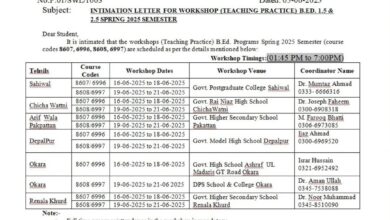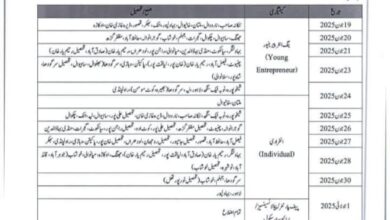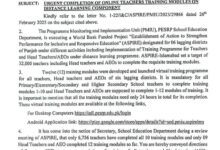Virtual University to Conduct Tests for Heads
Contents
Virtual University to Conduct Tests for Heads of Punjab School Education Department
The Punjab School Education Department, under the leadership of Minister Rana Sikandar Hayat, is set to undergo a significant transformation with the introduction of a testing process for heads of schools, facilitated by the Virtual University of Pakistan. This initiative aims to enhance leadership quality, streamline school administration, and improve educational outcomes across the province. Below is a detailed exploration of this development, its implications, and the role of key stakeholders.
Background of the Initiative
In June 2025, Punjab Education Minister Rana Sikandar Hayat announced a series of reforms to address leadership gaps in government schools. One of the critical measures includes appointing permanent headmasters for 35,000 schools, as reported by ProPakistani. To ensure merit-based appointments, the Virtual University has been tasked with conducting standardized tests for candidates vying for these leadership roles. This move aligns with the minister’s commitment to transparent and merit-driven administrative appointments.
Key Objectives
- Enhance Leadership Quality: Ensure school heads possess the necessary skills and knowledge to manage institutions effectively.
- Improve School Management: Address issues like discipline, academic performance, and administrative efficiency through competent leadership.
- Promote Transparency: Use standardized testing to eliminate favoritism and ensure merit-based selections.
Role of Virtual University
The Virtual University of Pakistan, known for its expertise in online education and assessment, will design and administer the tests. With a robust platform for conducting secure, scalable examinations, the university is well-equipped to handle this large-scale initiative. According to its official website, the Virtual University has a history of conducting professional assessments for various public and private sector organizations.
Features of the Testing Process
- Standardized Format: Tests will include multiple-choice questions, case studies, and situational judgment tasks to assess leadership and administrative skills.
- Online Delivery: Leveraging the university’s e-learning infrastructure, tests will be conducted remotely to accommodate candidates across Punjab.
- Secure Proctoring: Advanced monitoring tools will ensure the integrity of the examination process.
- Comprehensive Evaluation: Assessments will cover educational policy, school management, leadership principles, and problem-solving.
Minister Rana Sikandar Hayat’s Vision
Rana Sikandar Hayat has been at the forefront of educational reforms in Punjab, emphasizing accountability and performance. During a press conference on June 13, 2025, he announced a 400% increase in the education development budget, as reported by Dawn. His vision for the testing initiative includes:
- Strengthening School Leadership: By selecting capable heads, schools can achieve better academic and administrative outcomes.
- Teacher Accountability: Plans to assess teachers’ performance through similar mechanisms, as noted in APP.
- Student-Centric Reforms: Improved leadership will support initiatives like the Foundational Literacy and Numeracy (FLN) Camps launched in May 2025.
Recent Achievements Under Hayat’s Leadership
| Initiative | Details | Impact |
|---|---|---|
| Appointment of Headmasters | 35,000 permanent headmasters with Rs 10,000 monthly allowance | Addresses leadership gaps |
| Education Budget Increase | From Rs 32 billion to Rs 110 billion | Enhances infrastructure and access |
| FLN Camps 2025 | Over 6,000 camps in 12 districts | Improves enrollment and student health |
| ECE Classrooms | Mandated for all primary schools | Increases early childhood education access |
Implementation Timeline
The testing process is expected to align with the expedited recruitment directive issued by Minister Hayat in June 2025. While exact dates have not been disclosed, the following timeline provides an overview based on available information:
- Test Development (July–August 2025): Virtual University designs the assessment framework.
- Candidate Registration (September 2025): Eligible candidates apply through an online portal.
- Test Administration (October–November 2025): Examinations conducted across Punjab.
- Results and Appointments (December 2025–January 2026): Successful candidates appointed as headmasters.
Challenges and Mitigation Strategies
Implementing a province-wide testing system presents challenges, but the Virtual University and Punjab Education Department are prepared to address them:
- Challenge: Limited digital infrastructure in rural areas.
- Solution: Set up testing centers in district headquarters and provide offline options where necessary.
- Challenge: Ensuring test security and fairness.
- Solution: Use AI-based proctoring and randomized question banks.
- Challenge: Resistance from existing staff.
- Solution: Conduct awareness campaigns to highlight the benefits of merit-based appointments.
FAQs
What is the purpose of the Virtual University’s test for school heads?
The test aims to select qualified and competent candidates for headmaster positions in Punjab’s government schools, ensuring effective leadership and improved educational outcomes.
Who is eligible to take the test?
Eligible candidates typically include senior teachers, deputy headmasters, or other educators with relevant qualifications and experience, as determined by the School Education Department.
How will the Virtual University ensure test integrity?
The university will use secure online platforms, AI proctoring, and randomized question sets to prevent cheating and ensure fairness.
When will the tests be conducted?
While exact dates are pending, tests are likely to occur between October and November 2025, based on the recruitment timeline.
How will this initiative impact students?
By appointing capable school heads, the initiative will enhance school management, discipline, and academic performance, ultimately benefiting students.
Conclusion
The collaboration between the Virtual University and the Punjab School Education Department, under Minister Rana Sikandar Hayat’s leadership, marks a pivotal step toward educational reform. By introducing standardized testing for school heads, Punjab is setting a precedent for merit-based appointments and effective school management. This initiative, coupled with increased education funding and other reforms, promises to elevate the quality of education across the province. As the testing process unfolds, stakeholders remain optimistic about its potential to transform Punjab’s educational landscape for the better.









